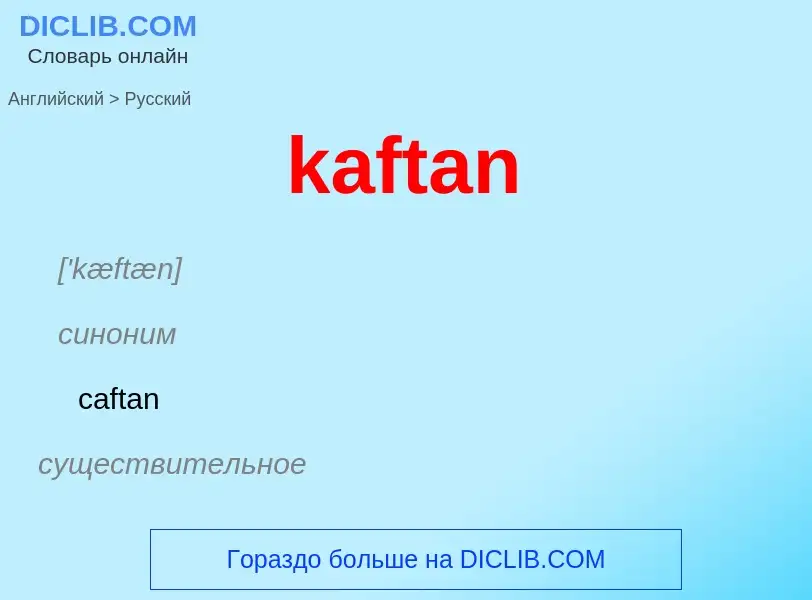Перевод и анализ слов искусственным интеллектом ChatGPT
На этой странице Вы можете получить подробный анализ слова или словосочетания, произведенный с помощью лучшей на сегодняшний день технологии искусственного интеллекта:
- как употребляется слово
- частота употребления
- используется оно чаще в устной или письменной речи
- варианты перевода слова
- примеры употребления (несколько фраз с переводом)
- этимология
kaftan - перевод на русский
['kæftæn]
синоним
существительное
общая лексика
кафтан
женское нарядное платье в «восточном» стиле (без пояса, с рукавами колоколом)
Персия
восточный халат с поясом
['kæftæn]
существительное
общая лексика
кафтан
женское нарядное платье в «восточном» стиле (без пояса, с рукавами колоколом)
Персия
восточный халат с поясом
длинный восточный халат
Википедия

A kaftan or caftan (; Persian: خفتان, khaftān) is a variant of the robe or tunic. Originating in Asia, it has been worn by a number of cultures around the world for thousands of years. In Russian usage, kaftan instead refers to a style of men's long suit with tight sleeves. It may be made of wool, cashmere, silk, or cotton, and may be worn with a sash. Popular during the time of the Ottoman Empire, detailed and elaborately designed garments were given to ambassadors and other important guests at the Topkapı Palace. Variations of the kaftan were inherited by cultures throughout Asia and were worn by individuals in Russia (North Asia, Eastern Europe and formerly Central Asia), Southwest Asia and Northern Africa.
Styles, uses, and names for the kaftan vary from culture to culture. The kaftan is often worn as a coat or as an overdress, usually having long sleeves and reaching to the ankles. In regions with a warm climate, it is worn as a light-weight, loose-fitting garment. In some cultures, the kaftan has served as a symbol of royalty.


![Depiction of [[Ertugrul]] wearing a kaftan Depiction of [[Ertugrul]] wearing a kaftan](https://commons.wikimedia.org/wiki/Special:FilePath/Ertugrul-gazi-1.jpg?width=200)
![A female kaftan offered by Ali Pacha of [[Algeria]] to the crown of [[Sweden]] on the occasion of a peace treaty, 1731. A female kaftan offered by Ali Pacha of [[Algeria]] to the crown of [[Sweden]] on the occasion of a peace treaty, 1731.](https://commons.wikimedia.org/wiki/Special:FilePath/Female Kaftan.jpg?width=200)
![Persian]] by a later hand. [[Isabella Stewart Gardner Museum]] Persian]] by a later hand. [[Isabella Stewart Gardner Museum]]](https://commons.wikimedia.org/wiki/Special:FilePath/Gentile Bellini 009.jpg?width=200)
![Jewish]] children with a school teacher in [[Samarkand]], wearing kaftans (circa 1910). Jewish]] children with a school teacher in [[Samarkand]], wearing kaftans (circa 1910).](https://commons.wikimedia.org/wiki/Special:FilePath/Jewish Children with their Teacher in Samarkand cropped.jpg?width=200)
![The first [[Mughal Emperor]] [[Babur]] dressed in a kaftan. The first [[Mughal Emperor]] [[Babur]] dressed in a kaftan.](https://commons.wikimedia.org/wiki/Special:FilePath/Babur idealisiert.jpg?width=200)
![''Evreu cu caftan'' ([[Jew]] in kaftan) by [[Nicolae Grigorescu]]. ''Evreu cu caftan'' ([[Jew]] in kaftan) by [[Nicolae Grigorescu]].](https://commons.wikimedia.org/wiki/Special:FilePath/Nicolae Grigorescu - Evreu cu caftan.jpg?width=200)

![Portrait of the artist's wife, Marie Fargues, in a kaftan, by [[Jean-Étienne Liotard]]. Portrait of the artist's wife, Marie Fargues, in a kaftan, by [[Jean-Étienne Liotard]].](https://commons.wikimedia.org/wiki/Special:FilePath/Jean-Étienne Liotard - Portret van Marie Fargues, echtgenote van de kunstenaar, in Turks kostuum.jpg?width=200)
![[[Tzar]] [[Feodor I]] wearing a kaftan. Antiquities of the Russian country 1846–1853, Solntsev, Fedor Grigorievich. [[Tzar]] [[Feodor I]] wearing a kaftan. Antiquities of the Russian country 1846–1853, Solntsev, Fedor Grigorievich.](https://commons.wikimedia.org/wiki/Special:FilePath/Drevnosti RG v4 ill008.jpg?width=200)
![Green kaftan designed by [[Sybil Connolly]] (1970s) Green kaftan designed by [[Sybil Connolly]] (1970s)](https://commons.wikimedia.org/wiki/Special:FilePath/KAFTAN - front.jpg?width=200)
![21st century woman wearing kaftan, [[Spain]]. 21st century woman wearing kaftan, [[Spain]].](https://commons.wikimedia.org/wiki/Special:FilePath/Sitting woman in Fundació Cultural Privada Rocamora (02).jpg?width=200)
